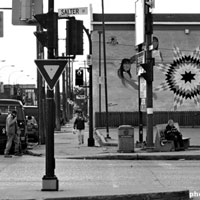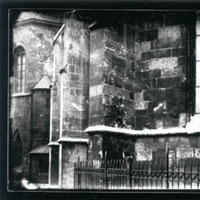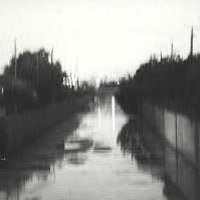- About Us
- Columns
- Letters
- Cartoons
- The Udder Limits
- Archives
- Ezy Reading Archive
- 2024 Cud Archives
- 2023 Cud Archives
- 2022 Cud Archives
- 2021 Cud Archives
- 2020 Cud Archives
- 2015-2019
- 2010-2014
- 2004-2009
 |
Ezy Reading: |
The timing of things can be ever so odd...
Towards the end of March I was saddened to learn of the passing of an old friend of mine. I say 'friend' even as I really only knew him a little, but in the short time during which we were acquainted I felt like I genuinely had a sense of the man and who he was, and him of me. It was a real connection. We hadn't spoken in years but his story always stayed with me, and the years that had passed since our last meeting didn't lessen the impact upon me of the news regarding his death.
I'm always fairly averse to reprinting material on The Cud outside of our annual 'Best Of' anniversay issue, and this month I had fully intended to write a new article, but as I was scanning through our archives today and searching for some inspiration it struck me that it was five years ago this very week that I had written about my friend in this magazine. As I said, the timing of things can be ever so odd.
I figured, in light of recent events it was only fitting that I share again with you what I had to say about this man half a decade ago. I'm glad he found some happiness in his final years.
He'll be missed.
Ezy Reading- April 18, 2005
Release
This last weekend, somewhat out of nowhere, I received an email from a man I'd only met briefly, and about five years ago.
I need not mention the man's name, but here was the body of the email:
Dear Evan,
I realise it has been quite a few years since we first met and I'm not even sure if this is still an active email address. I hope it is, as I've always remembered our conversation. I just wanted to let you know that I'm much better and have finally found the peace I was always looking for. It came in the form of my new wife.We were married this past January. I am a better man for it!I hope you are well. Write me of your news when you have the time.Be well.
(Name Withheld)
Back in 2000, as ever while on a visit to see the family in Massachusetts, I was seated on a stool and whiling away the afternoon hours chatting to family w orking behind the bar and sharing tales with some of the Warren Lunch's many 'seasoned' locals. One particular afternoon I had the good fortune of meeting a man in his fifties who wasn't a dedicated regular, though I had seen him from time to time. After a couple beers and some light banter about differences between Australia and America he gradually opened up and shared a little of his background.
orking behind the bar and sharing tales with some of the Warren Lunch's many 'seasoned' locals. One particular afternoon I had the good fortune of meeting a man in his fifties who wasn't a dedicated regular, though I had seen him from time to time. After a couple beers and some light banter about differences between Australia and America he gradually opened up and shared a little of his background.
As a youth, he'd had an adventurous childhood, falling in with the local Irish mob in his teens and skipping school so that he could deliver money bags across town for an income that far exceeded what most local Peabody folk could expect to be earning from the local tannery. When the Vietnam War broke out, however, he and his brother both volunteered to join up. Both underage -one sixteen and the other seventeen- they believed the war would offer them an escape not just from their working class surrounds, but from the criminal life as well, something they felt was increasingly threatening to swallow them up. But after managing to fool the U.S. Army of their actual age, darker, dangerous realities lay ahead.
Though he shared details over the course of that afternoon which I need not -and would rather not- repeat, suffice to say the two brothers, serving as grunts on the ground in the thick of the Vietnam conflict, saw a great deal and suffered a great deal. Friends were made and lost in short spaces of time, so much so that by the end of it all my bar-mate could not bring himself to initiate friendships with new arrivals and fresh reinforcements to his platoon for fear of losing another man he'd made a connection with. Everything we've heard about Vietnam era troops rarely seeing their enemy and, when they did, ha ving trouble distinguishing between civilian or combatant was confirmed in story after story. Eventually both men were, in turn, seriously wounded and sent back home to recover and rehabilitate in military hospitals. The younger brother lost his eye, and my drinking companion permanently injured his right leg when he caught shrapnel from a landmine.
ving trouble distinguishing between civilian or combatant was confirmed in story after story. Eventually both men were, in turn, seriously wounded and sent back home to recover and rehabilitate in military hospitals. The younger brother lost his eye, and my drinking companion permanently injured his right leg when he caught shrapnel from a landmine.
What followed that afternoon was not a cheerful recollection of war stories and heroics, rather it was the account of a man still severely scarred by what he had seen and experienced during the war. Like so many others he returned to America unable to ever truly reconnect with a normal life. He and his brother had since become estranged, primarily because of the stark difference between one brother's ability to cope with the trauma of it all, and another's inability to do so. Indeed he spoke with anger of what he felt were the insufficient mental-health support mechanisms available for returning soldiers to truly recover from their suffering in the 1960's and 1970's. Instead, reduced to mainly living off a veteran's pension and lost between jobs and decrepit apartments, he had spent much of the previous twenty-five years at a loss. Even as he had recently begun meeting with a psychiatrist once a week, he was still, so many years on, waking up in the middle of most night's sleep covered in sweat and haunted by the image of a young Vietnamese boy he had shot dead in combat.
Beer and spirits were probably the last thing my friend had needed that day, or indeed on any day as he struggled to cope with his past, but I guess he had found some rare, receptive company that afternoon that was willing to listen. I'd never really heard such tales firsthand, and certainly not accompanied with this kind of anguish. So many of our grandfathers, just like the other talkative old locals in my grandmother's bar, had chosen to remove the anguish from their war stories and talk instead of heady women, booze and heroic pincer movements that took place across the field of battle. Who could blame them? Some memories are perhaps better left suppressed and, if at all possible, forgotten. And why inform others of such an ordeal in detail? How could they comprehend such suffering? No, for most it was better that others never have to know, and grim specifics would be glossed over for them.
And why inform others of such an ordeal in detail? How could they comprehend such suffering? No, for most it was better that others never have to know, and grim specifics would be glossed over for them.
Still, for one sad, troubled man seated in the Warren Lunch that afternoon, he'd never taken that step towards recovery. He couldn't suppress, and he certainly couldn't forget.
In the years since my visit I'd always remembered our conversation and asked after him from time to time, but especially since my grandmother passed away and the bar changed hands it was harder to keep track of folks that frequented the Warren Lunch. I can't emphasise enough how much this man was in need of healing, in need of a release from guilt and regret, and liberation from sorrow. I hoped that one day he might, somehow, be pulled out of his lonely misery and become able to move on. But I wondered how much of a chance he truly had, addicted to the bottle and never going forward.
This in mind, it was with such a sense of overwhelming joy that I received my surprise email this week. Even the most tortured of souls have a chance, and here was a man with such a good heart that he wholly deserved that opportunity. I wish him and his new wife nothing but the best.
Ezy Reading is out every month. Send your comments to feedback@thecud.com.au
